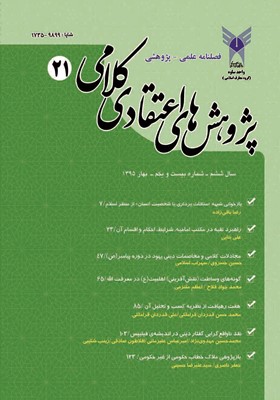نقد ناواقعگرایی گفتار دینی در اندیشهی فیلیپس
محورهای موضوعی : کلام اسلامیمحمدحسين مهدوينژاد 1 , امیرعباس علیزمانی 2 , افلاطون صادقی 3 , زينب شکيبي 4
1 - دانشگاه پيامنور
2 - دانشگاه تهران
3 - دانشگاه پیام نور
4 - دانشگاه پيامنور
کلید واژه: واقعگرايي, ناواقعگرايي, بازيهاي زباني, گرامر, شکل زندگي, باور دینی, فیلیپس.,
چکیده مقاله :
يکي از بحثهاي پُر دامنه فلسفه دين که در قرن بيستم تحت تأثير آراء ويتگنشتاين پرورش يافته، نا واقعگرايي است و يکي از ناواقعگرايان افراطي، فيليپس است. او واقعيت را امري کاملاً زباني ميداند و زبان را خالق همه اشياء؛ همچنين با توجه به مباني پوزيتويستياش مفاهيم ديني را داراي مرجع عيني نميداند، چون ارجاع به واقعيت را خاص علم ميداند، لذا نظريه او نوعي نظريه غيرشناختگرايانه در باب دين خواهد بود و اين نظريه منجر به نفي مفاهيم متافيزيکي از جمله «خدا» ميشود. این نوشتار درصدد است، ابتدا مبانی و اصولی را که نهایتاً منجربه غیرشناختاری بودن زبان دینی از نظر فیلیپس میشود بررسی نماید و در گام بعد با تبیین لوازم این نظریه به نقد آن بپردازد.
One of the most boisterous topics of the philosophy of religion that has been rooted from the wittgenstien's view points, is the non-realisme of religios propositions. Phillips as a follower of wittgenstien has trid to offer a radical non-realistic. He thought that the fact is completely linguistic and language is creator of all things. According of his positivist principles, religious concepts have no references to facts. Because this kind of reference is specially for Knowledge. Finally he has accepted the non-cognitive of religious belief and so, on the baisis of this non-realism, he has to deny the objectivity of the metaphysical concepts such as (God). primarily this thesis intended to express the principles that resulted non-cognitive religious language and then expresses the necessaries and criticisms of this theory.
1- استينزبي،درک،1386، علم، عقل و دين،ترجمهعلي حقي، پژوهشگاه علوم و فرهنگ اسلامي.
2- تريگ،راجر،1385، عقلانيت و دين، ترجمه حسن قنبري، پژوهشگاه علوم و فرهنگ اسلامي.
3- زنديه، عطيه، 1386، دين و باور ديني در انديشه ويتگنشتاين، نشر نگاه معاصر.
4- عليزماني، امر عباس، 1387، سخن گفتن از خدا، پژوهشگاه فرهنگ و انديشه اسلامي.
5- مهدوينژاد، محمدحسين، 1384، دين و دانش، انتشارات دانشگاه امام صادق(ع).
6- ميلاني نباب، محمد، 1384، لوريک ويتگنشتاين متفکر زبان و زمان، ترجمه هدايت علوي تبار و...، مهرنيوشا.
7- يوهان گلاک،هانس، 1388، فرهنگ اصطلاحات ويتگنشتاين، ترجمه همايون کاکاسلطاني، 1388،گام نو.
8- فيليپس، دين در آئينهي ويتگنشتاين، ترجمه مصطفي ملکيان، مجله هفت آسمان، شماره 18، تابستان 82.
9- فرو ـ تالیا، فلسفهی دین در قرن بیستم، ترجمه انشاء ا... رحمتی، 1382، تهران: پژوهش و نشر سهروردی.
1- Ludwing Wittgenstein (1953), Philosophical Investigation ed. G.E.M. Anscombe and R. Rhess, Trans G.E.M. Anscomb (Oxford) Blackwell.
2- Austin, William Harvey (1976), The Relevance of Natural Science to Theology, Newyork. The Macmillan Press Ltd.
3- Barrett, Cyril, Wittgenstein on Ethics and Religious Belief (1991).
4- Herrmann, E., 1994, Scientific Theory and Religious Belief. Kampen: kok Pharos.
5- Moore, G., 1988, Beliving in God, Edinburgh: to and T. Clack.
6- KLinefelter, Donalds. "P.Z. Phillips as Philosopher of Religion", journal of The American Academy of Religioun, vol 42, No 2, Jun 1974.
7- Wittgenes fin. Wittgenestin’s Lectures, Cambridge 1930, 1932, From The Notes of J. King and D. Lee. Ed. Desmond Lee (Oxford, Black Weel, 1980).
8- Wittgenestin, Philosophical Remarks, [1929-30], ed. R. Rhee, tr. R. Hargreaves and R. White (Oxford: Black Weell, 1975).
9- Philosophy of Psychology [1945-7, German-English Parallel Text], Volume 1, ed. G.E.M. Anscombe and G.H. Von Wright, tr. G.E.M. Anscombe (Oxford: Blackweel, 1980).
10- Last Writings on The Philosophy of Psychology [1948-9] German-English Prallel Text, Volume 1. ed, G.H von Wright and H Nyman tr.C.G. Luckhardt and M.A.E. Aue (Oxford: Blackweell, 1982).


